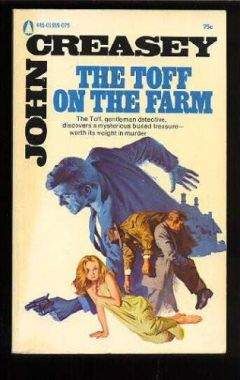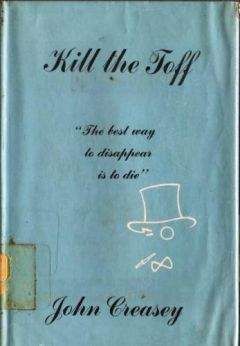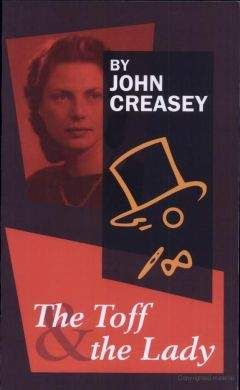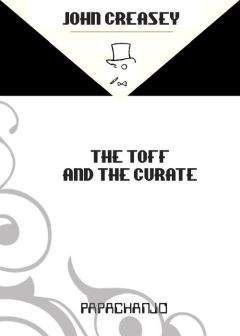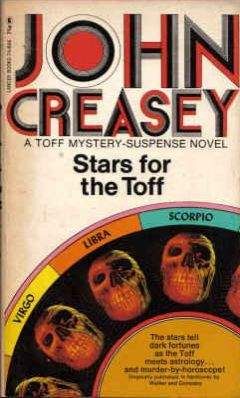John Creasey - The Toff In Town
What had happened between Allen and Pauline Dexter?
He felt, vaguely and yet with a stirring of a new alarm, that she had bent him completely to her will.
Allen looked away, and spoke roughly:
“Haven’t you heard enough?”
“Yes, quite enough,” said Rollison. “I still think you’d better come with me.”
“I’m staying here!”
Barbara broke her long silence.
“Won’t it—won’t it be better just to let Bob broadcast?” she asked. “You said yourself that everything might be all right after Saturday. And if the broadcast can settle it, don’t interfere. It can’t do any serious harm.”
“I don’t give a damn what harm it does,” said Allen harshly. “I’ll be able to rest, that’s all that matters now. I can’t stand this any longer, my nerves won’t take it.” He shouted now. “So clear out, Rollison!”
“I wish it were as easy as that, but there are complications,” said Rollison. “Remember Snub Higginbottom?”
Barbara started. “Is he back?”
“Where does he come in, except that he works for you?” asked Allen. “I remember you, now. You were with him in Regent Street a few weeks ago—I told Barbara you looked as if you’d come right out of the pages of the Tailor & Cutter.” He gave a little, mirthless laugh. “That isn’t far out. Well, what about Snub?”
“He also lent a hand,” said Rollison. “As a result, he disappeared. Pauline Dexter tells me that she knows where he is. I can’t imagine he’s having a very nice time, and I don’t think they’ll stick at murder if it serves their purpose.”
Barbara exclaimed: “No!”
Allen swung round on her:
“You seem to have forgotten how to think or talk, all you do is to run round with a face as long as a wet week, bleating: “Oh, dear, what will happen next?” I’m fed up to the teeth with it.” He ignored the crushed look in Barbara’s eyes, and turned on Rollison. “Supposing Snub has caught a packet? That’s up to him—and up to you. I told you to keep out of it. I couldn’t have put it more clearly.” He stepped forward, and took Rollison by the shoulder. “You know where the door is— you know it a damned sight too well. I’m wondering if this was your little love-nest while I was away. Bar seems to think you’re the cat’s whiskers.”
Barbara cried: “Bob, oh, Bob!”
Allen pushed the unresisting Rollison again.
“Caught you out, have I? The guilty secret at last, and——”
Barbara said in a low, strangely clear voice:
“You’ve sunk about as low as men can sink. I’ve tried—how I’ve tried—to help you. But now——”
Allen shot out his hand and grabbed her shoulder. He pulled her towards him, as he had done when she had first threatened to ask the police to help. He seemed to have forgotten that Rollison was with them.
“You’ll stay here and do what you’re told I If you don’t, you’ll——”
He snatched one hand away and made as if to slap her across the face. Before his hand landed, Rollison jabbed a short-arm blow to the chin which made Allen’s head jerk back. He staggered away from Barbara, who stood as if petrified, her face white, her lips parted. Rollison pulled Allen forward and repeated the blow, and Allen slumped down, unconscious.
Rollison stopped him from falling heavily, then slipped his hand into Allen’s inside coat-pocket and drew out a foolscap envelope. Inside was a copy of the script which Rollison already had. There was also another typewritten sheet—and a glance told Rollison that it was the new version which Pauline wanted broadcast. He tucked the envelope into his own pocket.
“I think I had better get him away for a bit,” he said quietly. “He’s not himself, don’t forget that.”
Barbara drew aside in tacit acquiescence. Rollison dragged Allen to the door. Sam was in the hall, and his eyes rounded.
“Knocked ‘im cold?” he demanded eagerly.
“Help me downstairs with him, and then come up here— you’re on guard in the hall for the rest of the day,” said Rollison briskly. “Mrs. Allen will get you a comfortable chair. I’d rather you weren’t here on your own,” Rollison added to Barbara, who nodded vaguely, uninterested now.
They got downstairs without being seen, and the cab was so close to the entrance that it was easy to lift Allen inside without the man in the street noticing. Rollison climbed in and Sam slammed the door. Perky started the engine and drove away at moderate speed.
Allen’s head lolled back against the corner but he began to regain consciousness before they had reached Edgware Road. He blinked dazedly, sat upright and moistened his lips, then rubbed his jaw, which was already showing signs of swelling. He worked his mouth about slowly, but by then, there was an intelligent gleam in his “ Allison would not have been surprised had he tried to get out of the cab when they slowed down at a traffic jam. Instead, he looked at Rollison with sullen hostility.
“Where are you taking me?”
“To some friends,” said Rollison. “If you’ve any sense you’ll stay there, and you’ll be all right. Aren’t you tired of being Aunt Sally for Blane and his mob to knock down?”
“He’s not the only one who throws his weight about,” Allen growled. “Barbara shouldn’t—my wife shouldn’t be left alone at the flat,” he said. “It’s too big a strain on her.”
“So you have flashes of sanity,” said Rollison.
Allen drew in his breath—and then suddenly turned his face away. He gritted his teeth, as if to prevent himself from breaking down, took out a plump silver cigarette-case and rooted in his pockets for matches. Rollison gave him a light.
“What good will it do if I go into hiding?” Allen demanded at last. They’ll find me—they’ll always find me. They’re too strong for me and for you. It’s best to get it over; let them have their way. Perhaps I’ll be left in peace after that——”
“Isn’t it time you told someone what’s behind all this?” asked Rollison. “And why Pauline wants you to alter your script for to-morrow night?” When Allen did not answer, he went on: “This business appears to have started when you were half-way home from Burma. It followed something you did while you were in Burma. And it was something which made you more scared of the police than of Merino.”
“Who?” asked Allen, and added slowly: “You said something about Merino before—who is he?”
“Blane’s employer. Pauline Dexter’s boy friend,” said Rollison. “Haven’t you met him? He’s the man who telephoned you so often.”
Allen shivered.
“No, I haven’t met him, and I hope I never do. And—I’m not talking. It’s my affair, I’m going to do what the girl wants me to on Saturday, and then I’m through. If they won’t leave me alone then, I’ll kill myself.” He shivered again. “You may think I’m fooling, but I’ve never been more serious. I’m worth nothing to anyone. Bar looked at me just now as if she hated my guts—I know, I know, I asked for it, we needn’t go into that.”
Rollison said: “All right, you won’t talk about what happened in Burma——”
“I didn’t say anything happened there!”
“Then you won’t talk about the reason for the trouble, if you prefer to put it that way,” said Rollison, “and while you keep it to yourself, no one can do much to help you.”
“I don’t want anyone’s help!”
Rollison looked at him dispassionately, and could not feel much sympathy. Allen had become completely spineless— was sorry only for himself.
“I might let you have your own way if only you were concerned,” he said. “But Snub——”
“Don’t blame me for that! It’s your own fault.”
“Anyone’s fault but yours. Allen, I’m going on with this whatever you say or do. That’s final.”
There was silence . . .
Allen stared out of the window.
“What are you going to do with me?” he muttered at last.
“You’ll be told in due course,” said Rollison.
Allen didn’t protest. He’d lost all self-respect and every claim to help, and—Pauline Dexter had helped to make him the wreck he was. Sweet Pauline!
Perky took the back streets and came upon the Mile End Road by way of the Minories, then, driving along another narrow street, eventually reached the rear entrance to the gymnasium. Allen, slumped down in the corner, showed no interest in where he was going.
Rollison opened the door and jumped down.
“I’ll be back in a couple of jiffs,” he said, and added sotto voce to Perky: “Keep an eye on him.” He wondered, as he entered the comparative darkness of the big gym, if Allen would try to take this opportunity to escape.
In the corner, beneath the only lights, the fair-skinned young boxer was going for a man who had the advantage of two stones, years of experience and two inches in reach. The youngster gave an astonishing performance, knocking the other man about the ring as if he were a sack. Bill Ebbutt, gripping the rope tightly, stared with glistening eyes without offering a word of advice.
Rollison reached his side.
“Cor, strewth !” exclaimed Bill in a whisper, as he glanced round, “I told yer so, Mr. Ar, I told yer so—we got a champ there all right. Ain’t ‘e improved? Even in a coupla days, ain’t ‘e improved? Almost a miracle, the way ‘e’s improved.”
“He’s certainly good,” said Rollison. “Has he boxed in public yet?”
“Free times, before I got at ‘im,” said Bill Ebbutt. “Silly mugs, they’d ‘a let ‘im be knocked silly, all the guts would’a been knocked out’ve ‘im, ‘e wanted trainin’.” He raised his voice: “Okay, okay, Willie, leave a bit of ‘im fer ‘is missus. I’ll see yer in a minute,” he added as the boxers dropped their arms, “go an’ get a rub dahn. Not at all bad,” he added, for he was not a believer in excessive praise. Then he turned to Rollison. “You’re givin’ yerself quite a time, Mr. Ar, aincha?”
“One way and another, yes. Jolly phoned you about a hideaway, didn’t he?”
“Ho, yes.” Bill grinned, displaying his uneven, discoloured teeth. “I never would’a believed it, but Jolly’s getting’ quite pally. Want the man ye’ve brought now to keep that dead chap comp’ny?”
“No, Bill, this one’s alive. Young Allen. He might try to get away,” he warned, “I can’t quite make him out, but officially he’s hiding away from the police and from a woman who’s making merry-hell. If he does escape, don’t stop him—have him followed.”
“O-kay,” breathed Bill.
“And I’ll ring up for a report on how he’s behaving,” said Rollison. “Where are you going to send him?”
“ ‘E could stay ‘ere,” said Bill, but shook his head when he saw the frown on Rollison’s face. No? First spot the busies would look, I s’pose. Okay, then, ‘e’ll ‘ave to go into Dinky’s place. Know Dinky, don’t you?”
“That’ll do fine,” said Rollison. “Same address?”
“Same address,” said Bill. “Feed ‘im up like a prince, I s’pose?”
“Just look after him,” said Rollison. “I’ll tell Perky to go straight there, shall I?”
“Better not use Perky’s cab all the way, eyes at the back o’ their ‘eads, these flicking busies, an’ you never know wot the flamin’ narks might see. Coin’ with him?”
“Perhaps I’d better,” said Rollison.
“Okay. Tell Perky ter drive as far as Old Wattle’s,” said Bill, “I’ve told Wattle to ‘ave a van ready.”
Rollison nodded, patted Ebbutt on the shoulder, and went to the door. Before he reached it, Ebbutt was on his way to the dressing-rooms. Rollison smiled reflectively, then glanced into the cab and found Allen still hunched up in his corner.
“Old Wattle’s,” he said to Perky.
“Oke,” said Perky.
The drive to “Old Wattle’s took a quarter of an hour. They went through the dingier streets of the East End, passed row upon row of little houses, where children, some bare-footed and many of them in rags, played in the roadway and jeered and gestured at the passing taxi, and where women leaned against their doorways and talked with their neighbours and looked with furtive curiosity at it. Perky, who knew this district as well as he knew the West End, took a bewildering series of short cuts, drove under railway arches and down streets which looked as if they were dead-ends, skidded round corners, waved his hand at two policemen who were standing before a gaunt warehouse near the river, and eventually pulled up near a railway arch on which were the words: “Wattle—Storage—Removals—Garage.”
“Old Wattle’ was a very old man who needed a shave and a wash, and who smoked a dirty-looking black pipe. He carried on a curiously one-sided conversation with Perky, speaking in a voice so low that Rollison seldom caught his words As he waited, Rollison saw that all of the arches here were marked with the name Wattle. Presumably some of them were used as furniture warehouses; probably some were used, at times, to hide stolen goods.
Perky came away at last.
“Okay,” he said. “Get in.”
He revved up the engine and drove into the railway arch, which was dark and gloomy, lit only by the day-light which filtered through from the street. At the far end were several small vans and pantechnicons. Two or three men stood about, one of them making tea over a gas-ring. Nearest the road at this end of the arch stood a small, plain van.
Perky jumped down and told Rollison and Allen to follow him. He opened the back of the van, Rollison and Allen climbed in, and the doors were closed on them. Allen gave a long-suffering sigh, but made neither protest nor comment. They sat down on a wooden seat.
The van bumped over cobblestones, then smoothly along good roads. The only light came from a circular window in the back. Rollison realised that the driver was taking a roundabout route, to make sure that they were not followed.
At last they stopped.
“Here we are,” said Rollison.
The doors at the back were opened and a stranger—a little man in his shirt-sleeves—beckoned them. They were in a yard surrounded by high walls. At one end of the yard was a tall, Victorian house, an ugly pile which looked uninviting. This was Dinky’s—an apartment house in Bethnal Green.
Allen stood blinking in the bright daylight.
“What do you expect me to do?” he growled.
“Just stay where you are,” said Rollison. “I’ll see that your wife’s all right, and you’ll be safe here.”
“You mean, I’m a prisoner?”
Rollison said: “I mean you’ll be a fool if you leave.”
The journey back to Wattle’s took much less time than the outward journey.
Perky’s cab was gone. Old Wattle stood in the shadows of the arch, pulling at his pipe. He took it from his lips and pointed the stem towards one end of the lane. Another taxi, older and more dilapidated than Perky’s, stood by the kerb.
